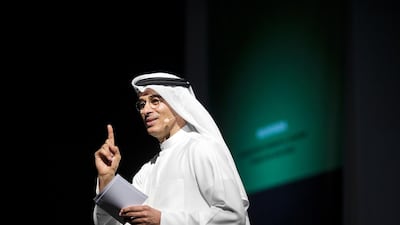The man whose company built Burj Khalifa knows a thing or two about scaling great heights in the business world.
Mohamed Alabbar, the chairman of Emaar Properties, shared his story when he gave a talk in Abu Dhabi in February at the invitation of the Salama Bint Hamdan Al Nahyan Forum for New Ideas.
Mr Alabbar, 59, started off by showing his audience a black-and-white photo of a dhow, taken in the 1950s when he was a child and Dubai was a quiet fishing port. It was his father’s ship, said Mr Alabbar, who was the eldest of two children raised in Dubai’s Rashidiya area.
“As captain of a ship, my father took risks, he went into the unknown,” Mr Alabbar said.
“He sailed with no GPS system, no weather forecast, there were pirates at sea, and these ships used to leak. Who chooses to sail for days on end with that in mind? You have to be brave and learn how to make big decisions.”
The lessons of his father’s courage were not lost on Mr Alabbar as he navigated through the choppy waters of business in his own career.
After graduating from Seattle University with a degree in finance and business administration, his first job was as a manager for the Central Bank of the UAE in Abu Dhabi. “I got married and had my first child. But I was restless in this city, wanting to do more – I wanted to be active,” he said.
After 25 years in Abu Dhabi, Mr Alabbar accepted a job offer to become the director of Al Khaleej Investments in Singapore, where the government-owned company had significant real estate interests. “It was a completely new environment, and I was eager to learn from this new government and business structure,” he said. “More than anything, in Singapore I learnt to be positive and not to hesitate.”
In 1992, Mr Alabbar, who by then had four children, decided to go back to Dubai with his family.
Upon his return, he was given the role as the founding director of the Department of Economic Development (DED).
Although Dubai at that time was a very different city to the one he had grown up in, it was also a fraction of the size it is today.
“It was a time for change,” Mr Alabbar said. “I took on new government partners and brought in new people who would work day and night, people who had pride in our city. We were dismantling the government system and we were passionate about making a change for our country. We took decisions and we acted to get the results. Continuous action is a must, in anything, in order to succeed.”
In 1996, Mr Alabbar initiated and organised the Dubai Shopping Festival to promote retail trade in Dubai.
As well as serving as a member of the Dubai Executive Council and the Dubai Economic Council, Mr Alabbar was also the vice chairman of Dubai Aluminium Company (Dubal) and Dubai World Trade Centre, and chairman of Dubai Cable Company.
Over the next six years, he said he worked around the clock to fulfil his obligations. “But to me it was not work. I was fulfilling a vision and an ambition, a passion that I have.”
Mr Alabbar says he was not motivated by financial gain. “There was no money in it anyway. The salary was about Dh22,000. It was the love that was really important, the pride that we could do it.”
In 1997, Mr Alabbar founded what became Dubai’s biggest listed property developer, Emaar Properties.
“I had a passion that our city would grow, so that’s how I started my first project, the Dh15 billion Dubai Marina project. Had I done it before? No. Did I have experience? No. I had a lot of love and a passion to learn.”
Emaar Properties’ next project was the Dubai Downtown development, which included the The Dubai Mall and Burj Khalifa, the world’s tallest building.
Construction of Burj Khalifa began in 2004, and continued despite the financial crisis that prevented the completion of several other high-profile building projects between 2007 and 2010, the year Burj Khalifa opened.
“Again, it was not about money or business,” he told his audience. “It’s about that child standing in front of the Burj Khalifa, looking at it and smiling and saying, ‘I belong to a civilised country and I am proud’.”
There were times when Mr Alabbar had his doubts as to whether he was the right man for the job. “I once asked Sheikh Mohammed [bin Rashid]: ‘Have you ever asked me if I have ever built anything like this before in my life?
“Did you ever ask me if I had hired someone who had ever built a building like this?’ He smiled and replied: ‘I trust you.’”
Despite his many achievements, Mr Alabbar spoke candidly with his audience on the subject of failure.
“I invested in the US and lost some money. I didn’t choose my partners well and it was a tough time. The biggest mistake I made was in not bringing in more good people around me earlier, and I am fixing that mistake. You need hungry people around you, hungry people can do things.”
Mr Alabbar said his failures have made him a stronger leader today. “Without failures we would be useless, failure makes you resilient. We grow because of our failures.”
business@thenational.ae
Follow The National's Business section on Twitter

